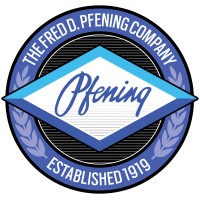
The Fred D. Pfening Company
We are the Fred D. Pfening Company. A fourth-generation and family-owned business. We have been proudly serving the baking and food industries since 1919, with equipment and systems to support our customers’ growth and success. Always adhering to our Customer First philosophy has made Pfening a valued partner and is why many of our customers have been with us for several decades. We actively listen to fully understand their vision and plan. By seeing the big picture, we can deliver a comprehensive, customized solution for every budget and need – large and small.






